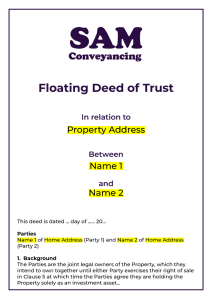Property Investment Tips for 2025
The appeal of property investment across England and Wales continues to attract those seeking passive income, long-term equity growth, or a diversified portfolio.
Whether you're a prospective buy-to-let landlord, looking for an additional income stream, or simply investing money for capital appreciation, property can be a powerful asset.
However, it's a substantial financial commitment and requires consideration. This guide offers actionable, up-to-date property investment tips for 2026 that cover market trends, financing options, and various investment types.
Here are some immediate tips to get you started:
- Don't just look at house prices. Research local demand, rental yields, and growth potential to avoid costly mistakes and find hidden gems.
- Choose your investment type (e.g., buy-to-let, flipping, REITs) based on your budget, time, and risk tolerance. The wrong fit wastes time and money.
- Factor in all costs: deposit, mortgage, stamp duty, legal fees, and ongoing maintenance. Underestimating expenses can quickly erode profits.
- Keep an eye on house prices, rental demand, and mortgage rates (BTL rates showing signs of stability in 2026). Market shifts impact profitability and timing. Read more: teShould I Fix My Mortgage for 2 or 5 Years?xt
Property investment for beginners
If you're new to this and asking yourself how to start property investment or how can I invest in property, you're in the right place. Property investment isn't just about buying a house; it's a strategic approach to building wealth.
What does property investment mean for you?
Rental Income: This is the regular money you receive from tenants, often the focus for buy-to-let investors. It provides a consistent cash flow.
Capital Growth: This refers to the increase in your property's value over time, allowing you to sell it for more than you paid. This is generally a longer-term strategy.
Common ways to start investing in property
- Traditional Buy-to-Let: This involves buying a residential property specifically to rent out. It's often the most straightforward entry point for beginner property investors, offering both a steady rental income and the potential for long-term capital appreciation.
- Property Flipping: A more active strategy where you buy a property, carry out renovations or improvements to increase its value, and then sell it relatively quickly for a profit. This demands a good eye for potential, managing contractors, and a solid grasp of market demand.
- Commercial Property: Investing in offices, retail units, or industrial spaces. This can offer higher yields but often comes with greater risk.
- Property Investment Trusts (REITs): If you're exploring how to invest in property with little money, REITs are an excellent option. These are companies that own, operate, or finance income-producing property. You buy shares in a REIT, much like buying shares in any other company, allowing you to invest in large portfolios of properties without direct ownership or management.
- Property Crowdfunding: Pooling money with other investors to collectively purchase a share in a property. It lowers the individual investment barrier and can be a good way for beginners to gain exposure without the full responsibility of property management.
Regardless of your path, remember that thorough research and a strong financial position are paramount. Building a foundation of knowledge is your first and most valuable investment.

In the market for an investment property? We specialise in buy-to-let purchase transactions:
-
Tailored Fixed Fee Quote
-
No Sale, No Fee Guarantee
-
On 99% of mortgage lender panels.
-
Fast Completions
The essential property investment tips for success
Successful property investment isn't about luck; it's about smart choices and solid preparation. Whether you're just starting or growing your portfolio, these tips for property investment are crucial.
Mastering your market research
Before you even think about buying an investment property, deep market research is vital. Don't just look at average house prices. You need to dig into:
- Local Demand: Are people looking to rent or buy here? What kind of tenants? High demand means you'll find tenants faster and keep your property occupied, cutting down on costly empty periods.
- Rental Yields: This is your annual rent as a percentage of the property's value. A strong yield means good cash flow. Research what similar properties are actually earning in your target area.
- Capital Growth Potential: Look at past price increases and planned developments. Safe areas, with new transport, job growth, or regeneration often signal strong long-term value increases. Remember regional variations for investment; hotspots can differ hugely across England & Wales.
- Amenities & Infrastructure: Good schools, transport links, shops, and healthcare make a property much more attractive to tenants and buyers, boosting its value.
Getting your finances in order
Property investment is a numbers game; a financial plan is essential to prevent nasty surprises. Consider these figures:
- Upfront Costs: Beyond the purchase price, budget for your deposit, Stamp Duty Land Tax (SDLT), legal fees (conveyancing), valuation fees, and any mortgage arrangement costs. Missing these can quickly eat into your budget.
- Financing Options: Explore buy-to-let mortgage products. While rates have moved around, BTL mortgage rates show signs of stabilising in 2026 and offer more predictability. Would an interest-only or repayment mortgage suit your investment goals?
- Ongoing Expenses: Factor in everything: mortgage payments, landlord insurance, maintenance, letting agent fees, ground rent/service charges (if leasehold), and periods when the property is empty.
- Tax Implications: Understand your tax duties, including income tax on rent and Capital Gains Tax when you sell. For some, buying through a limited company can offer tax efficiencies.
Property investment strategies: What's right for you?
Once you understand the basics of property investment, the next step is to consider which property investment strategies align best with your financial goals, risk tolerance, and available time.
There's no one-size-fits-all approach; what works for one investor might not be ideal for another.
Traditional Buy-to-Let
This remains a cornerstone strategy for many investors. It involves purchasing residential property to rent out to individuals or families.
The aim is typically a dual return:
- Consistent Rental Income: Providing a steady monthly cash flow.
- Long-Term Capital Growth: Benefiting from the property's increase in value over many years.
Buy-to-let is often favoured for its relative stability and passive income potential, especially if you use a letting agent.
However, it requires upfront capital for deposits and can be impacted by changes in tax laws and regulations.
Property Flipping
If you're looking for quicker returns and are prepared for a more hands-on role, property flipping might appeal.
This strategy involves:
- Buying Undervalued Property: Often properties needing significant renovation or modernisation.
- Adding Value: Through refurbishment, extensions, or layout changes.
- Selling Quickly: Aiming to profit from the added value in a shorter timeframe (typically 6-18 months).
Flipping can offer high returns, but it comes with higher risks, including renovation costs, market downturns during the holding period, and the need for project management skills.
Houses in Multiple Occupations (HMOs)
HMOs involve renting out individual rooms in a property to multiple, unrelated tenants.
This strategy can offer higher rental yields compared to traditional buy-to-let, as you collect rent from several sources.
- Higher Income Potential: More tenants often mean more overall rent.
- Diversified Income: If one tenant leaves, you still have income from others.
However, HMOs come with stricter regulations and licensing requirements and often demand more active management.
They are particularly popular in areas with high student or young professional populations.
Commercial Property Investment
Investing in commercial properties (like offices, retail units, or industrial warehouses) offers a different set of dynamics compared to residential.
Commercial leases are often longer (5-25 years), providing more stable and predictable income streams.
- Longer Leases: Reduces tenant turnover and void periods.
- Potentially Higher Yields: Depending on the sector and location.
This strategy typically requires a larger initial investment, a deeper understanding of business tenancy laws, and knowledge of specific commercial market sectors.
Portfolio Diversification
While not a standalone strategy, diversification is a crucial principle for any serious property investor. This means not putting all your eggs in one basket.
You can diversify by:
- Property Type: A mix of residential and commercial, or different types of residential (e.g., flats and houses).
- Location: Investing in different towns, cities, or regions to mitigate local market downturns.
- Strategy: Combining long-term buy-to-let with some shorter-term flipping projects, or integrating REITs for broader market exposure.
Diversification helps spread risk and can provide more consistent overall returns, even if one part of your portfolio underperforms. For example, if you have a problem tenant who refuses to pay rent, it only affects one part of your portfolio.
- Expert panel of conveyancing solicitors with local knowledge.
- Your transaction is protected by our No Sale, No Fee policy. Terms apply.
- Fixed fee conveyancing.
- We are on 99% of mortgage lender panels.
- We can solve any property challenge.
What are the risks when buying an investment property?
Risk Type | Risk |
|---|---|
Risk Type Financial | Risk
|
Risk Type Economic | Risk
|
Risk Type Tenant & Management | Risk
|
Risk Type Legal & Transactional | Risk
|
Is Buy-to-Let still viable in 2026?
Despite recent challenges, the answer for many remains a cautious 'yes', especially with the right strategy and support. While the landscape has evolved, the core appeal of rental income and capital growth persists.
What are these challenges?
Changes to mortgage interest tax relief (known as Section 24, which limits relief to a 20% tax credit) and increased Stamp Duty Land Tax for additional properties (e.g., an extra 3% surcharge) have impacted profitability for some landlords.
While some landlords have exited the market, particularly those with highly leveraged portfolios or less energy-efficient properties, recent official data paints a more nuanced picture.
A May 2025 IPSOS survey for HMRC found that 24% of landlords intend to sell some of their properties over the next 12 months, rising to 33% over five years, often citing changing regulations and tax rules.
However, other surveys, like one from Market Financial Solutions (March 2025), found that 36% of landlords plan to expand their portfolios, while only 9% plan to reduce them, and 70% of landlords remain cautiously optimistic about the market (Lendlord, June 2025).
Key market trends
- Strong Rental Demand: England & Wales continue to face a housing supply shortage, leading to consistently high rental demand. More people are renting for longer, mostly due to affordability issues, driving up rental prices in many areas (NRLA, March 2025).
- House Price Growth: While growth has moderated, house price growth is still anticipated in many regions for 2025 (e.g., 3-4% predicted by Lendlord, June 2025), offering the potential for long-term capital appreciation.
- BTL Mortgage Rates: After a period of volatility, the market in 2025 is showing signs of more competitive and stable BTL mortgage rates, with some lenders offering competitive fixed-rate products (HomeOwners Alliance, July 2025; YesCanDo Money, June 2025).
- Regional Variations: Northern cities and regeneration areas often show higher rental yields and stronger growth prospects compared to, for example, parts of London. Researching these regional variations for investment is crucial (NRLA, March 2025; Lendlord, June 2025).
Yield vs other investments
Compared to other investment options, buy-to-let offers a tangible asset that can provide both income (rental yield) and capital growth.
While stock market investments can offer liquidity and potentially higher short-term returns, they lack the physical asset backing and can be more volatile. Savings accounts offer security but typically minimal returns. Investing in property means you'll need to spend money to make money (maintenance and rental income).
How to invest in property with little money
The idea of property investment conjures images of large deposits and substantial capital. However, it's increasingly possible to get involved in the property market even if you don't have a substantial sum saved.
If you're wondering how to invest in property with little money, there are several accessible avenues to explore, particularly useful for beginners.
Property Crowdfunding
Property crowdfunding allows you to invest in a portion of a property alongside other investors. Instead of buying an entire property yourself, you contribute a smaller amount to a larger project.
This democratises access to property investment, making it possible to get started with as little as a few hundred or thousand pounds, depending on the platform.
- Lower Entry Barrier: Significantly reduces the capital needed to participate in a property deal.
- Diversification: You can spread smaller investments across multiple properties, diversifying your risk.
- Passive Income: Many crowdfunding platforms offer returns through rental income or a share of profits from property sales, often without the hassle of direct management.
Platforms vary, offering investments in residential, commercial, or development projects. Always research the platform's track record, fees, and project details.
This is where a Floating Deed of Trust could come in handy and should always be considered when buying property with someone who isn't a spouse or family member.
Protect your interest in a property and confirm how to sell. Drafted by a solicitor.
The first draft is within 1 to 2 working days* and includes:
- Deposit paid, costs of purchase, mortgage repayments and renovations.
- How to share property expenses, including the mortgage and bills.
- Share of property income - rent or gain on sale.
- How to sell the property.
Property Investment Trusts (REITs)
REITs are companies that own, operate or finance income-producing property. They are traded on stock exchanges, much like traditional company shares.
Investing in a REIT means you own a share of a portfolio of properties, without the direct responsibility of being a landlord.
- Liquidity: Unlike physical property, REIT shares can be bought and sold relatively easily on the stock market.
- Diversification: A single REIT often holds a diverse portfolio of properties across different sectors or regions.
- Income Focus: REITs are legally required to distribute a large percentage of their taxable income (typically 90%) to shareholders as dividends, making them attractive for income-focused investors.
This is an ideal option for those keen to gain exposure to the property market without the large capital outlay or management duties of direct ownership.
Partnerships
Consider partnering with friends, family, or other investors to pool resources. A joint venture allows you to combine capital, expertise, and even creditworthiness to acquire a property that might be beyond your individual reach.
This can be a smart way to get into buying an investment property with less personal capital, but it requires clear agreements and trust among partners.
Existing Equity
If you already own your home, you might be able to release some of the equity (the portion of your home you own outright) to use as a deposit for an investment property.
This involves remortgaging your main residence to borrow more against it to fund your new investment without needing fresh savings. However, it does increase the debt secured against your primary home.
- Fixed, competitive legal fees with no hidden costs.
- Expert conveyancing solicitors with proven local knowledge.
- No Sale, No Fee protection for your transaction. Terms apply.
- On 99% of mortgage lender panels.
- Fast completions.
- We can solve any property challenge.
Jack is our resident Content Writer with a wealth of experience in Marketing, Content, and Film. If you need anything written or proof-read at a rapid speed and high quality, he's your guy.
Caragh is an excellent writer and copy editor of books, news articles and editorials. She has written extensively for SAM for a variety of conveyancing, survey, property law and mortgage-related articles.












